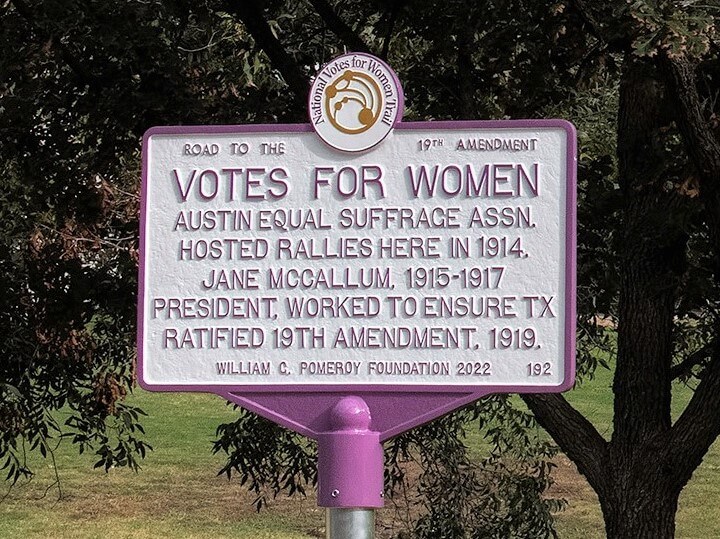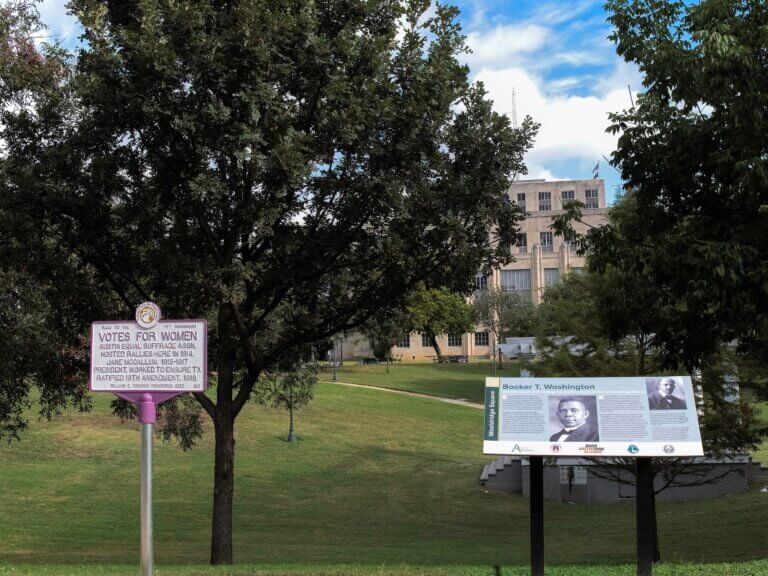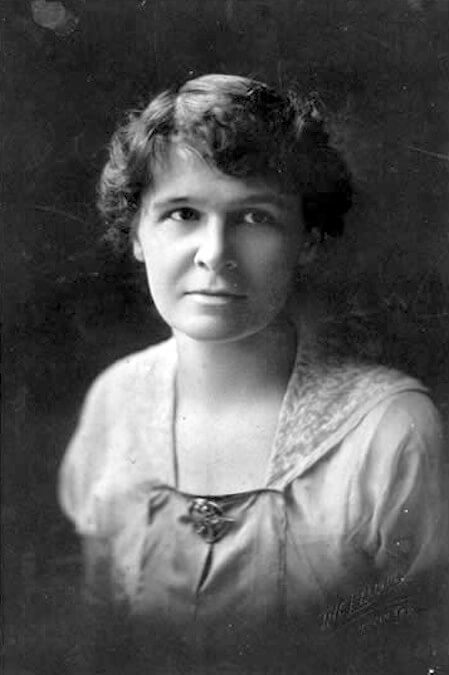- Program
- Subject
- Location
- Lat/Long
- Grant Recipient
-
National Votes for Women Trail
-
Event, People
- 900 Guadalupe St, Austin, TX 78701, USA
- 30.2723343, -97.7455959
-
National Collaborative for Women's History Sites
VOTES FOR WOMEN
Inscription
VOTES FOR WOMENAUSTIN EQUAL SUFFRAGE ASSN.
HOSTED RALLIES HERE IN 1914.
JANE MCCALLUM, 1915-1917
PRESIDENT, WORKED TO ENSURE TX
RATIFIED 19TH AMENDMENT, 1919.
WILLIAM G. POMEROY FOUNDATION 2022
After the House of Representatives and the Senate passed the 19th Amendment, it went to the States to potentially ratify it: Texas became the 9th state to do so. Though it would take 27 more states to obtain the three-fourths approval needed to add an amendment to the Constitution—a process which took just over a year—Texas’ early ratification in June of 1919 was indicative of the hard-work and tireless effort of Texas based advocates who pushed to establish women’s right to vote. At the center of the movement was Jane McCullum and the Austin Equal Suffrage Association, who hosted public rallies at Wooldridge Square Park to draw attention to the cause. These events not only gathered supporters together, but attracted publicity and press needed to further the cause.
Throughout the movement, the city of Austin played a central role in rallying activists who supported the women’s suffrage movement. Leading the charge was the Austin Woman Suffrage Association, which formed in 1908 under the Texas Equal Suffrage Association (TESA) and was chartered under the National American Women’s Suffrage Association. Not long after, Wooldridge Square Park was dedicated. The space had existed since 1839 as a public space but in 1909, however, amidst a rush of civic pride, then Mayor A. P. Wooldridge—for whom the park was renamed—cleaned up, dedicated, and developed it into a site that would host a number of lectures and talks relating to suffrage. In fact, the aforementioned Wooldridge was a noted supporter of the women’s suffrage movement. Included in a biography on Wooldridge written by Ruth Ann Overbeck is an editorial authored by Wooldridge which stated:
“In reply to your request to know how I stand on Woman’s Suffrage question, I will answer that I favor woman voting. I believe that suffrage should be conferred equally upon men and women, if they have equal character, intelligence and patriotism. I believe that woman are quite as intelligent as men, quite as generally educated, they love their country as much, and they are as sincere and honest in their purposes for the public good.” [1]
Spaces like Wooldridge Park were crucial to the movement, as they provided areas for large gatherings that would attract onlookers and interested parties. Here, the Austin community could gather to support the women’s suffrage movement, or for some, learn about it. And at the heart of all this activity was suffragette Jane Yelvington McCallum, who was both a leading activist in the fight for women’s suffrage and the eventual Texas Secretary of State. Born in 1877 in LaVernia, Texas, McCallum became involved in the fight for women’s suffrage throughout the early 20th century and remained politically and civically involved following the passage of the 19th Amendment.
Serving as the President of The Austin Woman Suffrage Association, McCallum not only spearheaded campaigns in Austin, but statewide as well, as she helped manage the public activities for the TESA. Following the adoption of the 19th Amendment she also advocated for education and prison reform, along with a number of other issues. A noted writer, her column, “Woman and Her Ways,” which highlighted issues pertaining to women’s rights, was included in the Austin American-Statesman through the 1940s.
Although the 19th Amendment was added to the Constitution in 1920 granting women the right to vote, racial discrimination throughout Texas prevented African American’s from participating at the ballot through the use of poll taxes, literacy tests, grandfather clauses, violence and the addition of a “white primary,” which codified racial discrimination at the polls. After the 19th Amendment was ratified, activists and leaders in Texas continued to push towards equal suffrage in the years that followed. Though the groundwork was laid in 1920, there was still work to do.
This marker can be visited at Wooldridge Square Park, which, as of 2022 remains a free public space which, according to austintexas.org, is a “favorite spot for music and picnics.”
[1] Overbeck, Ruth Ann. “Alexander Penn Wooldridge.” The Southwestern Historical Quarterly 67, no. 4 (1964): 524–58. http://www.jstor.org/stable/30237838.



